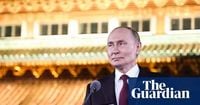Russian President Vladimir Putin has once again thrust the war in Ukraine into the global spotlight, declaring that peace could be within reach—if, as he put it, “common sense prevails.” Speaking to reporters in Beijing on September 3, 2025, at the close of a visit that saw Russia and China ink a major new gas pipeline deal, Putin struck a tone that was at once conciliatory and unyielding. His remarks, widely covered by Reuters and other international outlets, have reignited debate over the possibility of a negotiated settlement to Europe’s largest land war since World War Two.
“It seems to me that if common sense prevails, it will be possible to agree on an acceptable solution to end this conflict. That is my assumption,” Putin told journalists, according to Reuters. He went on to reference what he described as “sincere efforts by the United States to find a settlement,” singling out the current U.S. administration under President Donald Trump for its apparent desire to broker peace. “We can see the mood of the current U.S. administration under President Trump, and we see not just their statements, but their sincere desire to find this solution... And I think there is a certain light at the end of the tunnel. Let’s see how the situation develops,” Putin said.
But the Russian leader, in characteristic fashion, quickly tempered any optimism with a stark warning: “If not, then we will have to resolve all the tasks before us by force of arms.” This dual-track message—preference for diplomacy, readiness for war—has become a familiar refrain from Moscow since the conflict erupted in 2022. Yet, as the Associated Press points out, the context has shifted. Russia’s economy, battered by sweeping Western sanctions, is showing signs of strain, and the Kremlin is keen to showcase international partnerships, such as its growing energy ties with China.
Despite the overtures, Putin gave no indication that he was prepared to soften his longstanding demands. Chief among them: that Kyiv must abandon any ambition of joining NATO, reverse what Moscow alleges is discrimination against Russian speakers and ethnic Russians, and, crucially, accept Russia’s claim of sovereignty over at least the Donbas region in eastern Ukraine. “He did not, however, indicate any willingness to soften his long-standing demands that Ukraine abandon any ideas of joining NATO and reverse what the Kremlin has described as discrimination against Russian speakers and ethnic Russians,” reported BBC News.
Putin also floated the idea of direct talks with Ukrainian President Volodymyr Zelenskyy, but with a significant caveat: the meeting would have to take place in Moscow, be meticulously prepared, and result in tangible outcomes. “As for a meeting with Zelenskyy, I have never ruled out the possibility of such a meeting,” Putin said. “But is there any point? Let’s see.” He further stipulated that Ukraine would need to cancel martial law, hold elections, and organize a referendum on territorial questions as prerequisites for progress, according to StratNews Global.
Kyiv’s reaction was swift and unequivocal. Ukraine’s foreign minister, Andrii Sybiha, dismissed the suggestion of Moscow as a venue for talks as “unacceptable.” He emphasized that at least seven other countries, including Austria, the Vatican, Switzerland, and three Gulf states, had offered to host negotiations. “These are serious proposals and President Zelenskyy is ready for such a meeting at any point in time,” Sybiha stated on X (formerly Twitter). “Yet, Putin continues to mess around with everyone by making knowingly unacceptable proposals.”
Meanwhile, President Zelenskyy, undeterred by the diplomatic impasse, has been actively seeking greater support from Ukraine’s European allies. As Russian forces launched another massive air assault—deploying over 500 drones and dozens of missiles that struck energy and transport infrastructure at 14 sites across Ukraine—Zelenskyy called for increased pressure on Moscow. At least nine civilians were killed in the eastern town of Kostiantynivka, a critical logistics hub for the Ukrainian military, and four railway workers were injured in the attacks, as reported by Reuters.
“These are clearly demonstrative Russian strikes. It is only due to the lack of sufficient pressure, primarily on Russia’s war economy, that this aggression continues,” Zelenskyy said via Telegram ahead of meetings with Nordic and Baltic leaders. He reiterated his call for Washington to impose further sanctions on Russia if Putin does not agree to meaningful talks.
President Trump, for his part, has made no secret of his desire to broker a peace settlement. He has publicly encouraged a meeting between Putin and Zelenskyy and has threatened, though not yet implemented, secondary sanctions on Russia. The Trump administration’s approach, which Putin cited as a source of optimism, has been met with skepticism in Kyiv and among some European capitals, where there are concerns about the durability and fairness of any deal struck under current conditions.
The gulf between the two sides remains vast. While Putin insists that any settlement must recognize Russia’s annexation of four Ukrainian regions—a move Kyiv and most Western governments have denounced as an illegal land grab—Zelenskyy has made clear that Ukraine’s territorial integrity is non-negotiable. The Ukrainian president has also rejected the notion that Moscow can dictate the terms or venue of peace talks, especially while Russian forces continue to target civilian infrastructure and critical supply lines.
Despite the diplomatic posturing, the reality on the ground is grim. Russian drone and missile attacks have continued to devastate Ukraine’s energy grid and transportation network, complicating efforts to sustain the war effort and protect civilians. The economic toll on Russia is mounting as well, with Western sanctions biting deeper into key sectors and international isolation taking its toll. Yet, Putin’s government remains defiant, touting new energy agreements with China as evidence of its ability to weather the storm and reorient its economy eastward.
For now, the prospect of an imminent peace remains elusive. Both leaders appear locked into positions that leave little room for compromise, and the battlefield continues to shape the diplomatic chessboard. As Putin put it in Beijing, “Let’s see how the situation develops.”
The world watches, hopeful but wary, as the war grinds on and the search for a diplomatic breakthrough continues—one that, for now, remains just out of reach.


